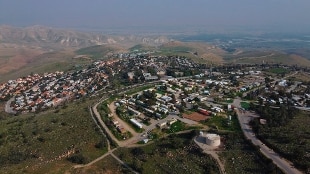- Gaza on 1 July 'day of anger' against Israel's plans to annex the West Bank
Share
June 29, 2020The Israeli plan to annex parts of the West Bank is "illegal". This was reported by Michelle Bachelet, UN High Commissioner for Human Rights.
The UN High Commissioner stressed that the "shock waves" of the Israeli annexation plan "will last for decades". "Annexation is totally illegal," Bachelet said in a statement. "Any annexation, whether it's 30% of the West Bank, or 5%."
Gantz: "1st July is not a sacred date for annexations"
July 1st "is not a sacred date" for Israel to begin implementing the disputed plan. Word of Defense Minister Benny Gantz. Sources close to the leader of the Blue and White party confirmed to the Dpa agency that Gantz expressed himself during a meeting with the American ambassador to Israel, David Friedman, and the special representative of the United States for international negotiations, Avi Berkowitz.
Meanwhile, the Jerusalem Post cites various well-informed American sources that Israel will not take measures to extend its sovereignty over areas of the West Bank this week. The coalition agreement between Benjamin Netanyahu and Gantz allows the premier to bring the annexes to the vote from July 1st, but - the newspaper writes - for that date "the plans and approval of the United States will not be ready". Netanyahu, it says, is rather considering the possibility of a declaration.
And just for 1 July in Gaza "the day of anger" will start, in protest against Israeli plans
Even the UN Secretary General Antonio Guterres, a few days ago invited the "Israeli government to abandon its annexation plans" , urging "Israeli and Palestinian leaders to engage in dialogue with the support of the international community".
"The annexation of parts of the occupied West Bank - said Guterres on Twitter - would constitute a serious violation of international law, would seriously damage the prospect of a two-state solution and would undermine the possibility of resuming negotiations".
Obviously the US Secretary of State, Mike Pompeo, is not of the same opinion. Israel has the US go-ahead to annex Palestinian territories, he said. "Decisions on extending Israel's sovereignty to those areas are decisions that Israelis must make," Pompeo told reporters. The Secretary of State spoke a few moments after the UN and the Arab League joined the appeal to Israel to abandon its plans to annex parts of the occupied West Bank.
On June 10, the Israeli Supreme Court quashed the 2017 law that would legalize Jewish settlements in the West Bank built on Palestinian private land as "unconstitutional." The decision is based on the fact, the court writes, that the law "violates the Palestinian property and equality rights while privileging the interests of Israeli settlers over Palestinian residents." It concerns about 4,000 houses built by settlers.
The West Bank is part, together with the Gaza Strip, of the "Palestinian territories" and of the historical-geographical region of Palestine. With the Oslo agreements (1993) most of the West Bank was placed under the administration of the Palestinian National Authority, although Israel maintains settlements and build new ones, and despite the construction of a defensive barrier along the temporary border between the two states. In 2005, Israel implemented the unilateral withdrawal from Gaza alone, without removing the embargo on the entry of goods and people.

